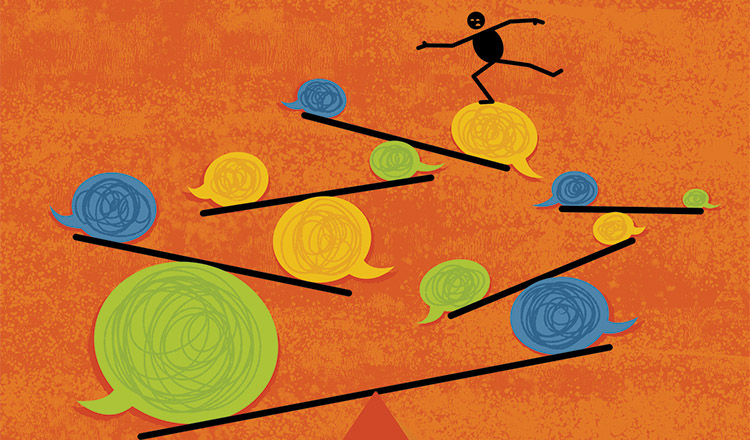Disagreeing without being disagreeable in election season
In ancient Greece, Aristotle’s Nicomachean Ethics asserted that people were, by nature, political animals. Engagement in the political process was viewed as necessary, not only for the benefit of the community but also for one’s own virtue and life satisfaction. Flip on the television or pick up a newspaper these days, however, and such a high-minded view of civic engagement is hard to fathom. This year’s presidential election has been a hot (and often heated) topic of conversation. Now we are processing the results, just as we head into the holidays, when social gatherings are commonplace. With that in mind, we queried several Purdue faculty members for advice on maintaining civility among friends and family after the campaign.
“There’s a lot going on in the world right now, and one’s view of oneself is playing a big role in discussions with others,” says social psychology professor Margo Monteith, whose research focuses on stereotyping and prejudice. The contentious presidential campaign has introduced some unique volatility into our world and is threatening many individuals’ sense of self, she notes. “Being nonbiased is very important to many people’s self-image.” When confronting someone whose opinions contradict your own, you can respond one of two ways: effect an ‘autonomy restrictive’ approach in which you confront the person and say, “It’s unacceptable for you to think that way,” or an ‘autonomy supportive’ approach in which you appeal to the individual’s values or attitudes and say, “Have you considered that such thoughts might violate a value that you hold dear?” Both appeals can be effective, Monteith says, but supporting another’s autonomy typically works better. And when heading into a situation like a holiday dinner that you suspect may require self-regulation, Monteith recommends rehearsing a bit. “Remind yourself of prior punishments you’ve received for losing your cool; it will help you process new situations more carefully and offer a more intentional response.”
Political science professor James McCann, a specialist in public opinion and electoral processes, agrees that this election season has been tumultuous, but points out that dissension in the midst of a political campaign is nothing new. When John Adams ran for president against Thomas Jefferson in 1800, McCann notes, Adams supporters warned that a vote for Jefferson meant that all the horrors of the French Revolution would be revisited. “We live in a democracy where conflict is advocated and people are encouraged to speak their minds, and to a certain extent, political campaigns are all about dividing choices.” The tried-and-true ideologues are loud, McCann says, but they are relatively rare birds. “I think most people understand that they can engage in disagreements without being disagreeable — we just need to keep our minds open and our eyes on the greater good.”
Glenn Sparks, a professor in the Brian Lamb School of Communication, notes that effective listening is also critical in combating incivility, yet among the most difficult skills to cultivate. A specialist on the effects of mass media, Sparks notes that today’s interpersonal communications are increasingly cloaked in a shroud of anonymity, enabling speakers to shirk responsibility for their comments. Communicating face-to-face avoids this problem, Sparks points out, and allows us to focus on two very important nonverbal cues: facial expression and vocal tone. “Emotion is heavily communicated through these two channels, and these days, unfortunately, a primary emotion is anger.” When anger is perceived, it’s hard for people to empathize or listen responsibly to what’s being said, Sparks continues, so he recommends using the ‘smiling no,’ which helps to defuse negativity. When faced with a disagreeable opinion, Sparks suggests pausing, then saying, ‘That’s an interesting point you’re making there.”
“No one objects to being told he’s interesting, and it signals to the person that you’re listening and not just reacting.” Sparks says that many families also decide on ground rules at the outset of a gathering. “In my family, we screen off certain areas of conversation during dinner,” he says, “and if conversation starts drifting, redirect!”

